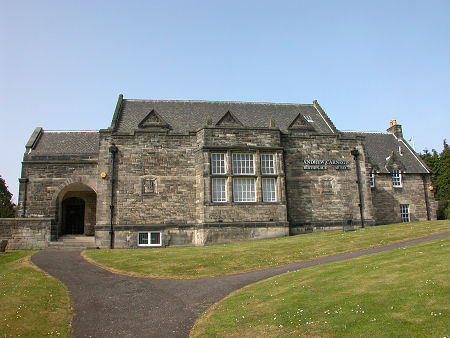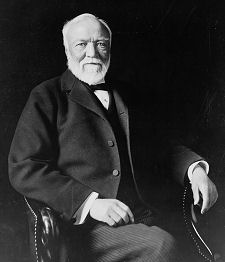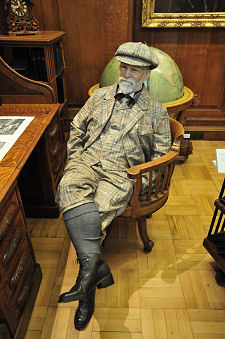 The Carnegie Birthplace Museum in Dunfermline |
Andrew Carnegie lived from 25 November 1835 to 11 August 1919. He was an American businessman of Scottish origin who founded the Carnegie Steel Company, which later became part of US Steel. One of the world's richest men in his day, he is principally remembered for funding large numbers of libraries and educational establishments in the US, Scotland and elsewhere.The wider picture in Scotland at the time is set out in our Historical Timeline.
Carnegie was born in Dunfermline. His father, William Carnegie, was a hand loom weaver, and the extended family had a strong tradition of self-education, political activism and liberalism. A particularly strong influence in his early life was Andrew's uncle, George Lauder, a grocer in Dunfermline. Uncle George taught the young Andrew about Scottish history. He also introduced him to the writings of Robert Burns, having him commit many of Burn's best works to memory. In 1842 another uncle, Ballie Morrison, was imprisoned for his part in a strike and this, too had a strong influence on the young Andrew.
With the advent of the factory system in the 1840s, weavers were required to migrate from working at home to working in factories. The Carnegie family's reputation for activism meant that William Carnegie found work increasingly hard to come by. So in 1848 he took his family, including the 13 year-old Andrew, to the United States, settling in Allegheny, Pennsylvania. Here both William and Andrew took work in a cotton mill.
The young Andrew looked to his own education by making use of the library of Colonel James Anderson, who made it available to working boys each Saturday night. Carnegie then took a number of jobs, moving from telegraph messenger boy to telegraph operator with the Pennsylvania Railroad Company; before rising swiftly to become Superintendent of the Pittsburgh Division of the Pennsylvania Railroad Company.
Meanwhile he had made a considerable amount of money from investments in railway sleeping cars; and moved on to make still more from investing his profits in an oilfield in Pennsylvania, then in a steel rolling mill. During the American Civil War Carnegie was appointed Superintendent of Military Railways and Telegraph Lines for the Union Government.
By the end of the war, Carnegie had moved heavily into investing in the steel industry, and after it he drove forward the replacement of the vast number of wooden bridges across the railway networks of the US with steel bridges. In 1868 Carnegie introduced the Bessemer steel making process into the USA from the UK and embarked on a course that by 1900 was to to make him one of the richest men in the most powerful nation on earth. In 1900 alone, Carnegie's personal share of his companies' profits amounted to $25,000,000.
In 1901 the 65 year old Carnegie wanted to retire and concentrate on doing good with his wealth. He therefore sold his steel making interests to John Pierpont Morgan for the sum of $480 million, of which Carnegie received $225 million personally. The result was known as US Steel.
Andrew Carnegie had long published articles and books proclaiming the need for the rich to put their wealth to good use, and from 1901 onwards he put his principles into practice. By the time he died in 1919, Carnegie had given over $350m to good causes (by some estimates, this would equate to over $76 billion today). In later life he returned to Scotland for part of each year, where he had purchased Skibo Castle near Dornoch as a highland residence.
Carnegie's philosophy can be summed up in a piece he wrote relatively early in his life:
Man does not live by bread alone. I have known millionaires starving for lack of the nutriment which alone can sustain all that is human in man, and I know workmen, and many so-called poor men, who revel in luxuries beyond the power of those millionaires to reach. It is the mind that makes the body rich. There is no class so pitiably wretched as that which possesses money and nothing else. Money can only be the useful drudge of things immeasurably higher than itself. Exalted beyond this, as it sometimes is, it remains Caliban still and still plays the beast. My aspirations take a higher flight. Mine be it to have contributed to the enlightenment and the joys of the mind, to the things of the spirit, to all that tends to bring into the lives of the toilers of Pittsburgh sweetness and light. I hold this the noblest possible use of wealth.
Andrew Carnegie's name and legacy live on in the many instiutions he funded and founded, and in many street names. He is also remembered in the Andrew Carnegie Birthplace Museum in Dunfermline.


